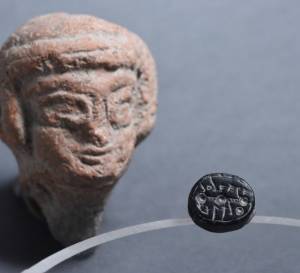The Land of Israel constantly reveals hidden treasures, testifying to its rich history. This time, archaeologists discovered two rare seals in Jerusalem’s Old City from the time of King David.
A rare 2,500 year-old First Temple era seal bearing a woman’s name, “Elihana bat Gael,” was recently discovered in excavations at the city of David, in Jerusalem Old City, the Israel Antiquities Authority (IAA) announced Monday.
Another unique seal belonging to a man named “Sa‘aryahu ben Shabenyahu” was found nearby.
According to the excavation directors, “the owner of the seal was exceptional when compared to other women of the First Temple period: she had legal status which allowed her to conduct business and possess property”
“Finding seals that bear names from the time of the First Temple is hardly a commonplace occurrence, and finding a seal that belonged to a woman is an even rarer phenomenon”, the researchers said.

The archaeological site in David’s City.(IAA)
After nine years of excavations, archaeologists at the site have reached the strata of ancient Jerusalem dating to the First Temple period, where they encountered a pleasant surprise: they found the two seals inside a structure built of magnificent ashlar stone.
The researchers believe that the well-constructed building was used as an administrative center.
According to archaeologists Dr. Doron Ben-Ami, Yana Tchekhanovets and Salome Cohen, excavation directors on behalf of the IAA, “personal seals, such as those of Elihana and Sa‘aryahu, were used for signing documents, and were frequently inlaid as part of a ring that was worn by the owner. In antiquity they designated the identity, genealogy and status of the owner of the seal”.
The rare woman’s seal, which is made of semi-precious stone, bares the mirror-writing of “to Elihana bat Gael”, inscribed in ancient Hebrew letters. The female owner of the ring is mentioned together with the name of her father.
“Seals that belonged to women represent just a very small proportion of all the seals that have been discovered to date. This is because of the generally inferior economic status of women, apart from extraordinary instances such as this,” explained Dr. Hagai Misgav of Hebrew University in Jerusalem.

The Elihana seal, together with a figurine of a woman from the First Temple period, which symbolized fertility and was also exposed in the Givati parking lot. (IAA)
“Indeed, the name Elihana does not appear in the Bible, and there is no other information regarding the identity of the woman, but the fact that she possessed a seal demonstrates her high social status,” Misgav added. “Most of the women’s seal that are known to us bear the name of the father rather than that of the husband. Here, as in other cases, this might indicate the relatively elevated status of Elihana, who depended on her original family, and not on her husband’s family. It seems that Elihana maintained her right to property and financial independence even after her marriage and therefore her father’s name was retained; however, we do not have sufficient information about the law in Judah during this period”.
“The name Eliha is known from a contemporary Ammonite seal and is the feminine form of the name Eli, known from the Bible. The script appearing on the seal is remarkably similar to the script on Ammonite seals, and this might indicate the foreign origin of the artisan who carved the seal and possibly the foreign origin of Elihana, who apparently came from east of the Jordan River,” Misgav speculated.
The second seal that was exposed in the excavation was also in mirror-writing and bears the inscription “to Sa‘aryahu ben Shabenyahu”. The name Sa‘aryahu appears on a sherd from the southern site at Arad, and apparently means “the Lord, which was revealed in a storm.”
By: Max Gelber, United with Israel

Free Ebook: 10 Best Places to Visit in Israel
The Land of Israel has provided the backdrop for some of the most important events in human history. From the Old City in Jerusalem to the Sea of Galilee, people from all over the globe visit the Holy Land each year to take in the breathtaking scenery and inspiration of Israel. Now you can experience this beauty for yourself from the comforts of home and maybe plan a trip of your own to Israel. Get the free, exclusive eBook from United with Israel: The 10 Best Places to Visit in Israel.
Do You Love Israel? Make a Donation - Show Your Support!
Donate to vital charities that help protect Israeli citizens and inspire millions around the world to support Israel too!
Now more than ever, Israel needs your help to fight and win the war -- including on the battlefield of public opinion.
Antisemitism, anti-Israel bias and boycotts are out of control. Israel's enemies are inciting terror and violence against innocent Israelis and Jews around the world. Help us fight back!






















